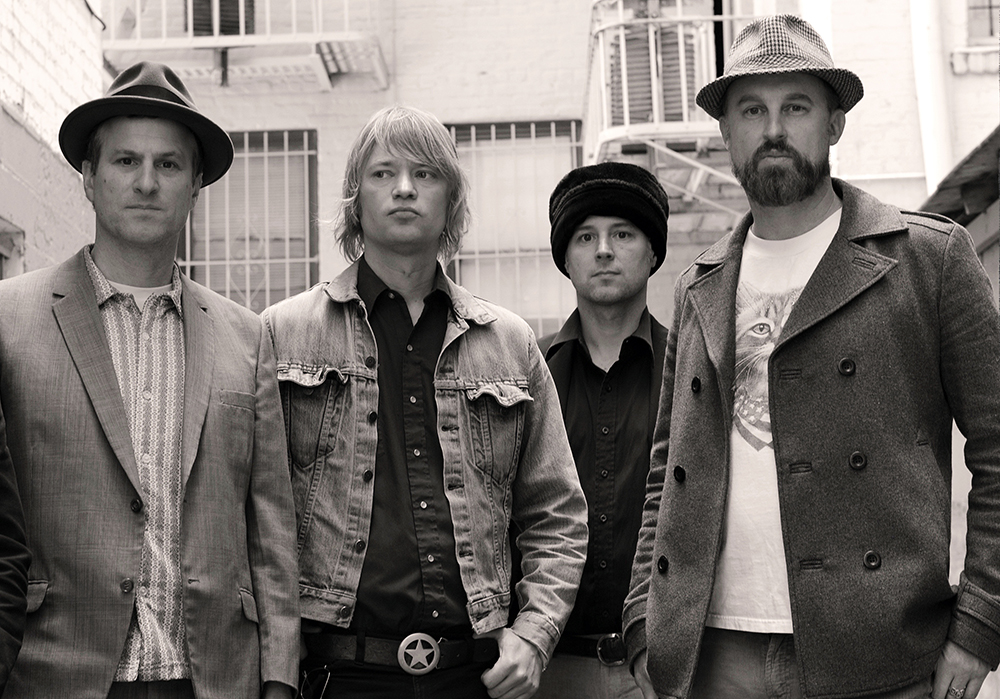CAKE will always be with us. I’ve gleaned this insight after more than 30 years of listening to the band, ever since my days in Dixon, California, when they were merely regional favorites, not international headliners. One indication of their longevity is the simple fact that the interview I conducted with lead singer/songwriter John McCrea for a Graceland Soundstage concert scheduled for five years ago still holds just as true today as it did then. After our chat, a little thing called Covid happened, and the show never took place. Yet here we are: CAKE will finally make their Mid-South appearance by kicking off this year’s season of concerts at the BankPlus Amphitheater at Snowden Grove on Friday, April 18th.
Shockingly, things have only gone from bad to worse since 2020, pandemics aside, but that’s kept the band’s outspoken political activism more relevant than ever. The landing page of their website sports the Turkish proverb, “When a clown enters a palace, he does not become a king, the palace becomes a circus,” and their Facebook page is dotted with exhortations to “never forget who Trump really is.” But they also take their activism in a more positive direction.
In honor of Earth Day and Arbor Day, the band will join forces with BankPlus Amphitheater, Mammoth Live, and Barbian Entertainment to plant a magnolia tree, Mississippi’s official state tree, on the venue grounds. The symbolic planting highlights CAKE’s decades-long commitment to environmental sustainability, including global reforestation efforts, clean energy innovation, and eco-conscious touring practices. The band also operates out of a 100 percent solar-powered recording studio in Sacramento, California, a facility that regularly generates more electricity than it uses. Now, in addition to the on-site planting, one lucky fan attending Friday night’s show will receive their very own magnolia tree to take home and plant.
Through all such efforts, a reliable constant has been the band’s musical aesthetic, yet it can’t be boiled down to any single genre. It’s more accurately characterized by its smallness and sparseness, as McCrea explained when I mentioned seeing the band at a festival of alt-rock superstars in the late ’90s. By then, the band had blown up, with their second album, Fashion Nugget, going platinum in 1997, but they weren’t always comfortable with other groups they were lumped in with at the time.
“It was a very strange experience for me,” said McCrea. “Everything was, like, big dumb rock, even ‘alternative’ was just about this big, sort of bulbous, wide-load sound, right? And we knew people were not gonna get it. I remember one critic called us ‘dinky beats,’ and that was meant to insult us. But for me, it was like, ‘Yes!’ I mean, obviously they didn’t get it, but it was good because I realized, ‘Okay, good. It’s sounding small.’”
Yet while the band’s sound was often sparse, it was expansive stylistically, with Vince DiFiore’s trumpet echoing everything from mariachi to jazz, McCrea’s dry delivery and richly allusive lyrics drawing on all walks of life, and a taste for scrappy, dirty instrumental sounds. It was — and remains — decidedly anti-trendy, right down to the fishing cap McCrea often sports and the beat-up acoustic guitar he plays through “a Fender Sidekick amplifier, the kind that they give away for free when you buy a Telecaster.”
It’s always been a sound that’s resolutely D.I.Y. and unpretentious. Yet McCrea has typically been reluctant to confine the band to any aesthetic, even a sparse one. “I don’t want to make ‘less is more’ sound like the main goal,” he said, “but I think ‘less is more’ in the service of providing musical narrative, I could say that’s our prime directive. It should be a means to an end.”
At the heart of the CAKE experience lie the songs, of course, and the unpredictable turns of phrase which can appear in them. Listing some of his greatest influences, McCrea noted some of the usual suspects: “I love Hank Williams Sr. for his economy, his ability to tell a story with very few words. I love Cole Porter for his cleverness and how he’s clever without being completely annoying. And then I guess Bob Dylan is similarly clever, you know, and mostly not annoying. I like Leonard Cohen a lot for his lyrics and vocal melody. I mean, all of these people write great melodies.”
Turning to his contemporaries, McCrea zeroed in on Stephen Malkmus of Pavement as a favorite. “I would definitely list him as one of my top songwriters, especially of the ’90s.” But he went on to emphasize that, while CAKE are unabashedly political in their practices and in their extra-musical communications, he avoids the vagaries of topical struggles in his craft as a tunesmith.
“I don’t enjoy songs that are sort of beating you over the head in any way,” McCrea said. “I do think it’s an emergency right now, like the humans are having a confusing time and we need to focus. And I don’t see why every part of our presence should be about music. I think I’d like to let the music be about music, and let our social media be about whatever the hell we want. But some part of me resists talking about music too much on our page. Somebody wanted to interview me for a book titled something like Rock Stars’ Inspirations, or something like that, and it sounded like a really fascinating book with lots of interesting artists, but I just didn’t want to do it because of the title. You know, ‘rock stars’ — there’s just so much baggage with that, and I’m against it. I’m ideologically opposed to that, you know? I don’t really want to be a celebrity. I don’t want to be talking about what I’m doing as necessarily more important than what anybody else is doing today.”


